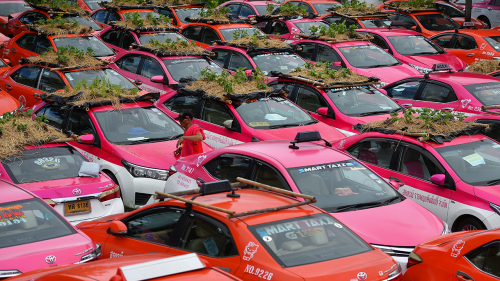The People's Summit, Land Rights, and Taxi Gardens

Check out the week's top stories in food, agriculture, and global development.
Top Story
The People’s Summit
The UN Food Systems Summit (UNFSS), called the “People’s Summit,” showcased global coalitions and bold national commitments to food security and resilient food systems, including a $10 billion commitment from the US for global and domestic food systems. The UNFSS multisectoral approach also elicited participation and commitments from the private sector and philanthropy, including a five-year $922 million commitment for nutrition efforts from the Bill and Melinda Gates Foundation.
Yet, as with the UNFSS Pre-Summit, UNFSS was not without protests. Hundreds of civil society groups, academics, and social movements signed a declaration that critiqued high levels of corporate involvement in the Summit. New analysis of the UNFSS multi-stakeholder approach found that the Summit’s action track three, “boost nature positive production,” included 26 private sector corporations, yet only included one Indigenous group. Indigenous peoples protect 80 percent of global biodiversity. A three-day counter-summit, the Global People’s Summit on Food Systems, began earlier in the week, culminating in virtual and in-person protests against UNFSS.
Council Insights
High Stakes at UNFSS
Childhood malnutrition has stunted one in four of the world’s children under five. “The haunting question hanging over the [UN Food Systems] Summit is: what might these lives have accomplished for all of us were they note stunted by childhood malnutrition?” writes Roger Thurow. As the world focuses on big policy commitments made this week, it is essential to remember the human cost of failing to deliver on good food for all.
Food & Agriculture
Reevaluating Extension
The United States has a long history in international agricultural extension with mixed results. A new policy brief from the Council’s Gloria Dabek argues that the climate crisis necessitates a comprehensive revision of US international extension efforts, centering farmers’ needs from the lab to the fields.
Fever in Haiti
The first outbreak of African swine fever in 37 years has been reported in Haiti. It is the second nation in the Americas to report an outbreak, with the neighboring Dominican Republic being the first. Worries of a more widespread American ASF outbreak are growing.
Indigenous Land Protection
Protections and land rights for the Piripkura tribe, an Indigenous group in Brazil, has been renewed for a six-month period. The fate of the Piripkura tribe has become a test of indigenous rights under far-right President Bolsonaro, who has advocated for the expansion of farming into Amazon reservations.
Deeper Dive
What is international extension?
Agricultural extension and advisory services consist of the services that bring research-based innovations and findings to farmers and producers. This field-based application and education is the traditional idea of extension, but the concept can expand to include a wide range of activities across the agricultural value chain, including linking farmers to markets and expanding technology.
Data Crunch
Funding Farmbots
Iron Ox, a company that uses robots that are integrated with a hydroponic system that consumes 90 percent less water than traditional farms, received $50 million in a funding round led by Bill Gates' Breakthrough Energy Venture.
Resilience
Opinion – A New Approach
Millions of African farmers, fisherfolk, Indigenous peoples, women’s networks, and other civil society organizations, sent a letter to AGRA donors signed by 160 international organizations demanding an end to funding for failing Green Revolution projects. The signatories argue the funding lays groundwork for corporate-led agriculture that breeds dependency, environmental, and health deterioration.
Big Ideas
Garden-Turned-Cabs
One Bangkok cab company turned its vehicles into mini vegetable gardens after COVID-19 regulations put the cabs out of service. The cooperative grows produce on the roofs of 300 disused cabs, providing its drivers and members with food to share while also sending a symbolic message to the government, asking them to do more to help with the hardship.
DC Report
Heat Protections
Biden directed the Department of Labor’s Occupational Safety and Health Administration (OSHA) to draft workplace standards to protect outdoor and warehouse workers from extreme heat, following a summer of record high temperatures. According to a CDC study of heat-related deaths in the US from 1992-2006, the annual death rate for crop workers was 20 times higher than for all US civilian workers.
Big Actors
UN Efforts Undermined by Pandemic
A report tracking progress on SDG indicators under FAO stewardship found that the COVID-19 pandemic might have pushed an additional 83 to 132 million people into chronic hunger in 2020. Principal areas of concern included increasing water stress, economic loss due to disasters, gender inequality in land rights and earnings, and an increase in food price volatility.
Trade & Commodities
Inflation Here to Stay
Food prices have risen in 13 of the past 15 months, coming close to their 2011 peak. Low-income countries are especially vulnerable to pricier food imports, which is partially attributed to episodes of swine flu in China’s pig industry, global extreme weather events, and disruptions at key bottlenecks in the food supply chain.

